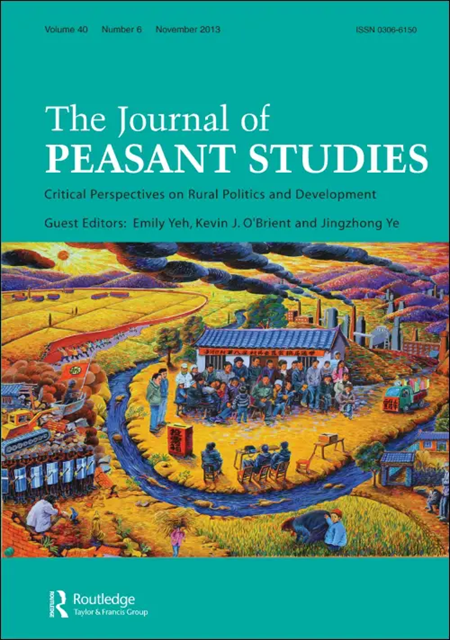暴力圈地,侵犯生计:菲律宾边境的环境和军事领土
IF 4.8
1区 社会学
Q1 ANTHROPOLOGY
引用次数: 25
摘要
环境治理的政治地理可能与森林边界不平衡的土地变化重叠和趋同。当保护领土的治理与圈地趋同并加强圈地时,空间可能会受到权威和暴力的控制,在农业政治经济不平衡的背景下,这将使生计面临更大的风险——其结果反映了“暴力圈地”。本文考察了在菲律宾巴拉望岛的一个保护区中,土著资源使用者如何协商环境治理与军事化叛乱空间重叠的话语和物质影响。根据当地经验,我们研究了普林塞萨港地下河国家公园缓冲区的环境和军事治理重叠的围栏如何加剧了当地政治经济中出现的生计脆弱性。我们认为,保护区的森林边界似乎不太容易治理,往往是最贫穷的,高度政治化和有争议的政治和生态避难空间。在这里,稀缺的森林资源受到严密的管理,桀骜不驯的团体寻求庇护,因为军事力量将当地行为视为犯罪和危险的行为,并将保护和军事干预合并为强制性治理。我们得出的结论是,只有批判性地探讨治理过程和圈地如何汇合,从而产生结构性和话语性暴力,并使政策制定者明白这一点,土著人民才能成功地解决边境暴力圈地的双重困境。本文章由计算机程序翻译,如有差异,请以英文原文为准。
Violent enclosures, violated livelihoods: environmental and military territoriality in a Philippine frontier
The political geography of environmental governance can overlap and converge with uneven agrarian change in forest frontiers subject to violent enclosures. When the governance of conservation territories converges with and reinforces enclosures, spaces can be controlled with authority and violence that places livelihoods at greater risk in the context of uneven agrarian political economies – the outcomes of which reflect ‘violent enclosures’. This paper examines how indigenous resource users negotiate the discursive and material impact of environmental governance converging with militarized-insurgent spaces as overlapping enclosures in a protected area on Palawan Island, the Philippines. Drawing on local experiences, we examine how the livelihood vulnerability arising in the local political economy is exacerbated by access and use constraints from the overlapping enclosures of environmental and military governance in the buffer zone of Puerto Princesa Subterranean River National Park. We argue that the seemingly less governable forest frontiers of protected areas are often the poorest, highly politicized and contested spaces of political and ecological refuge. Here, scarce forest resources are managed closely, and recalcitrant groups seek refuge as military powers frame, conflate and manage local behaviour as criminal and dangerous, merging conservation and military interventions as coercive governance. We conclude that only by critically engaging how governance processes and enclosures converge to yield structural and discursive violence – and by making this apparent to policy makers – will indigenous peoples successfully negotiate the double bind of violent enclosures in frontiers.
求助全文
通过发布文献求助,成功后即可免费获取论文全文。
去求助
来源期刊

Journal of Peasant Studies
Multiple-
CiteScore
10.50
自引率
17.60%
发文量
99
期刊介绍:
A leading journal in the field of rural politics and development, The Journal of Peasant Studies (JPS) provokes and promotes critical thinking about social structures, institutions, actors and processes of change in and in relation to the rural world. It fosters inquiry into how agrarian power relations between classes and other social groups are created, understood, contested and transformed. JPS pays special attention to questions of ‘agency’ of marginalized groups in agrarian societies, particularly their autonomy and capacity to interpret – and change – their conditions.
 求助内容:
求助内容: 应助结果提醒方式:
应助结果提醒方式:


